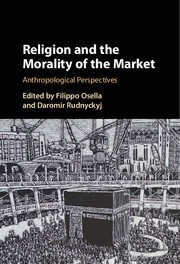Book contents
- Frontmatter
- Dedication
- Contents
- List of Figures
- List of Contributors
- Acknowledgments
- Introduction: Assembling Market and Religious Moralities
- 1 Risk, Fate, Fortune: The Lives and Times of Customs Inspectors in Southern China
- 2 Morality, Markets, and the Gospel of Prosperity
- 3 Religious Myths Retold: Masters and Servants in India's Corporate Culture
- 4 Divine Markets: Ethnographic Notes on Postnationalism and Moral Consumption in India
- 5 Merit Economies in Neoliberal Times: Halal Troubles in Contemporary Sri Lanka
- 6 “Structural Adjustment Islam” and the Religious Economy in Neoliberal Mali
- 7 Assembling Islam and Liberalism: Market Freedom and the Moral Project of Islamic Finance
- 8 Persistent Forms: Catholic Charity Homes and the Limits of Neoliberal Morality
- 9 Marketizing Piety through Charitable Work: Islamic Charities and the Islamization of Middle- Class Families in Indonesia
- 10 “A Poor Muslim Cannot Be a Good Muslim”: Islam, Charitable Giving, and Market Logic in Sri Lanka
- 11 “For God and the Country”: Agricultural Migrations and their Moralities in South India
- 12 “The Globalization of Indifference”: On Pope Francis, Migration and Global Acedia
- Index
- References
1 - Risk, Fate, Fortune: The Lives and Times of Customs Inspectors in Southern China
Published online by Cambridge University Press: 13 April 2017
- Frontmatter
- Dedication
- Contents
- List of Figures
- List of Contributors
- Acknowledgments
- Introduction: Assembling Market and Religious Moralities
- 1 Risk, Fate, Fortune: The Lives and Times of Customs Inspectors in Southern China
- 2 Morality, Markets, and the Gospel of Prosperity
- 3 Religious Myths Retold: Masters and Servants in India's Corporate Culture
- 4 Divine Markets: Ethnographic Notes on Postnationalism and Moral Consumption in India
- 5 Merit Economies in Neoliberal Times: Halal Troubles in Contemporary Sri Lanka
- 6 “Structural Adjustment Islam” and the Religious Economy in Neoliberal Mali
- 7 Assembling Islam and Liberalism: Market Freedom and the Moral Project of Islamic Finance
- 8 Persistent Forms: Catholic Charity Homes and the Limits of Neoliberal Morality
- 9 Marketizing Piety through Charitable Work: Islamic Charities and the Islamization of Middle- Class Families in Indonesia
- 10 “A Poor Muslim Cannot Be a Good Muslim”: Islam, Charitable Giving, and Market Logic in Sri Lanka
- 11 “For God and the Country”: Agricultural Migrations and their Moralities in South India
- 12 “The Globalization of Indifference”: On Pope Francis, Migration and Global Acedia
- Index
- References
Summary
On the day that two Chinese bullet trains collided just south of Wenzhou en route to their final destination in Fujian Province in July 2011, it just so happened that China's most wanted fugitive – the Fujian-based smuggler Lai Changxing – was also finally extradited back to China from Canada to face charges for one of the nation's biggest smuggling and corruption scandals in the post-Mao era. Once anticipated as the headline-making event of the day, Lai's return to Beijing on the afternoon of July 23 all but disappeared from state media overnight when the tragedy of the Wenzhou crash and its subsequent botched rescue efforts came to dominate news channels and public attention. Although the date 7/23 quickly became synonymous with the disastrous event of Wenzhou's rail collision, Lai's uneventful return nonetheless developed its own spectral life as part of a growing conspiracy theory of fateful coincidences.
Infamous as the “shadow customs chief” in the port city of Xiamen, where he based his operations from 1996 to 1999, Lai at one point had controlled entire local departments of the Fujian Customs, with an estimated 160 customs staff, including Fujian's top bureau director and deputy director, all working with him to smuggle in more than 53 billion RMB (7.8 billion USD) worth of contraband across China's southeastern border (Shieh 2005). His political influence was rumored to extend beyond provincial leaders in Fujian all the way to Beijing's central government. Seeking political asylum in Canada, where he had fled in 1999 amid a sweeping anti-smuggling campaign against his operation, Lai claimed to be a victim of a political power struggle among China's top leaders in Beijing. Moreover, as an archetypical man who knew too much, he argued that in his exile, he had become a political threat to many still in power in China whom he could implicate in corruption from afar and who he said “want to get me back so they can shut me up for good” (Beech 2002).
Returned in handcuffs to China on the same day that the two bullet trains crashed, Lai soon became the center of a popular “wag the dog” conspiracy theory linking corruption in the Railway Ministry to the not-so-distant failings of Fujian Customs.
- Type
- Chapter
- Information
- Religion and the Morality of the Market , pp. 29 - 49Publisher: Cambridge University PressPrint publication year: 2017
References
- 1
- Cited by



